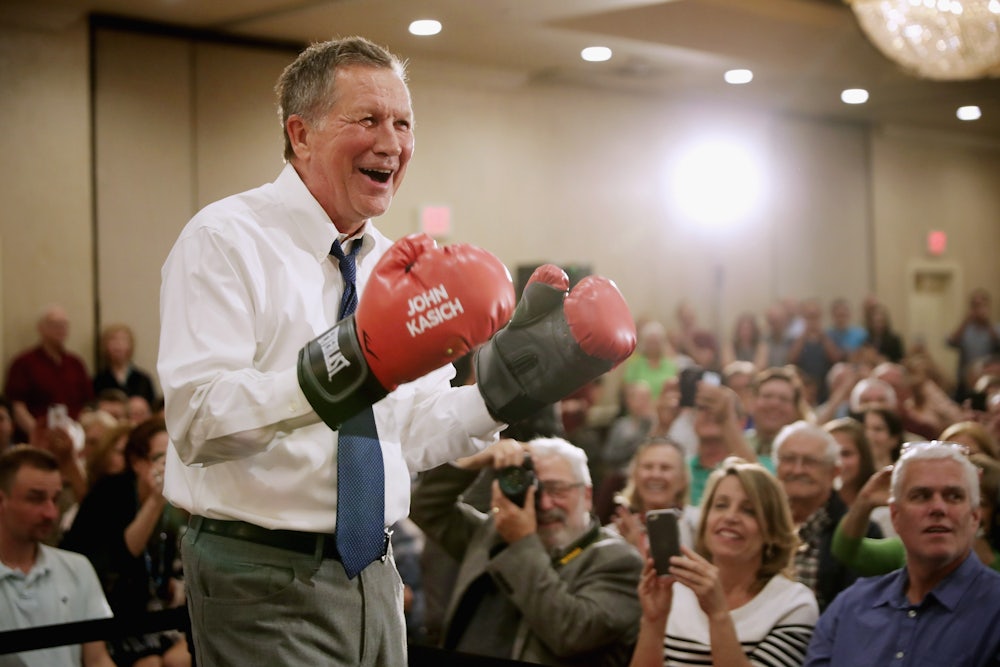The usual conservative arguments against granting statehood to Washington, D.C., hinge on studiously dry, procedural quibbles about amending the Constitution or worries that a D.C. state might exert undue influence on the federal government. But last week, in an interview with the Washington Post editorial board, GOP presidential candidate John Kasich admitted what his party won’t: that Republicans in Congress oppose representation for the District’s 660,000 residents because three-quarters of registered voters are Democrats. “[W]hat it really gets down to, if you want to be honest, is because they know that’s just more votes in the Democratic Party,” the Ohio governor said.
Michael Kinsley famously wrote, “A gaffe is when a politician tells the truth—some obvious truth he isn’t supposed to say.” These kinds of slips have become common for the GOP in the Obama era, most notably on the issue of voter ID laws. In 2012, the House majority leader of Pennsylvania claimed that the state’s restrictive legislation would “allow Governor Romney to win the state.” And a Republican congressman from Wisconsin gave the game away earlier this month. “I think Hillary Clinton is about the weakest candidate the Democrats have ever put up,” Rep. Glenn Grothman said. “And now we have photo ID, and I think photo ID is going to make a little bit of a difference as well.”
You can imagine Scott Walker smashing his bowl of Reagenesque jelly beans out of sheer frustration. After all, it’s pretty hard work to pass these laws with a straight face. The whole time, you’ve got experts reminding everyone that voter fraud doesn’t exist and former Republican staffers revealing the unconcealed glee with which you stripped the undeserving poor of the franchise. Then, once you’ve finally gotten your story straight, some loose-lipped jamoke comes along and says what everybody’s thinking?
Badger State Republicans seem to specialize in this kind of brazenness. In 2011, after conservative lawmakers in Wisconsin restricted collective bargaining for public employees, Senate Majority Leader Scott Fitzgerald acknowledged that the move was directly aimed at defunding Democrats’ political allies. “If we win this battle, and the money is not there under the auspices of the unions,” he said in a television interview, “certainly what you’re going to find is President Obama is going to have a much difficult, much more difficult time getting elected and winning the state of Wisconsin.”
This spontaneous truth-telling isn’t limited to unpolished backwater Republicans, either. Last fall, House Majority Leader Kevin McCarthy boasted of the trumped-up Benghazi commission’s negative impact on Hillary Clinton’s poll numbers. And the most prominent example is probably then-Senate Minority Leader Mitch McConnell’s declaration that “the single most important thing we want to achieve is for President Obama to be a one-term president” (a statement that led Ezra Klein to dub him “the most honest man in Washington.”)
What has compelled such honesty? My theory is that Republicans are so fully cocooned in their ideological echo chamber that they don’t realize they’re making a damning admission. In most of these cases, the GOP lawmakers were speaking to unthreatening conservative listeners when, unbidden, they blurted out exactly what they weren’t supposed to say. Fitzgerald was appearing on Megyn Kelly’s Fox News show. McCarthy was talking to her colleague Sean Hannity. (McConnell is the exception. One of the party’s most sagacious presences, he knew perfectly well the impact of his words but didn’t bother dissembling. Nobody cares less about what you think of him than McConnell does.)
The politician’s natural instinct for ass-covering has been dulled in Republicans due to the polarized media climate—one in which they’re communicating conservative messages to conservative audiences through conservative media organs—and an absence of genuine electoral threats. Unlike their ideological opponents, Republicans aren’t particularly interested in making a case to Americans who fall outside their traditional constituencies. How bizarre it would be if Virginia Governor Terry McAuliffe bragged to the press that restoring voting rights to felons, which he did last week, would disproportionately redound to Democrats’ benefit at the polls? Such an admission is hard to imagine because Democrats need to attract support from moderates as well as liberals, whites as well as blacks, the middle class as well as the poor. Even if they pursued political advantage as nakedly as Republicans (it could be argued that they do, though not by me), they’d have to conceal it with a lot of B.S. (much like then-Governor Martin O’Malley did when defending Maryland’s Rorschachian congressional districts).
But political doublespeak is precisely what Republican voters are sick of—especially those voters who have flocked to Donald Trump, who couldn’t concoct an excuse about voter fraud or state finance if he wanted to. While other Republicans were hiding behind the fig leaf of a bogus institutional precedent to explain why they wouldn’t hold hearings on President Obama’s Supreme Court nominee, Trump simply told the truth: that he didn’t want a liberal majority on the court, and Republican senators had the power to prevent it. So much simpler.
